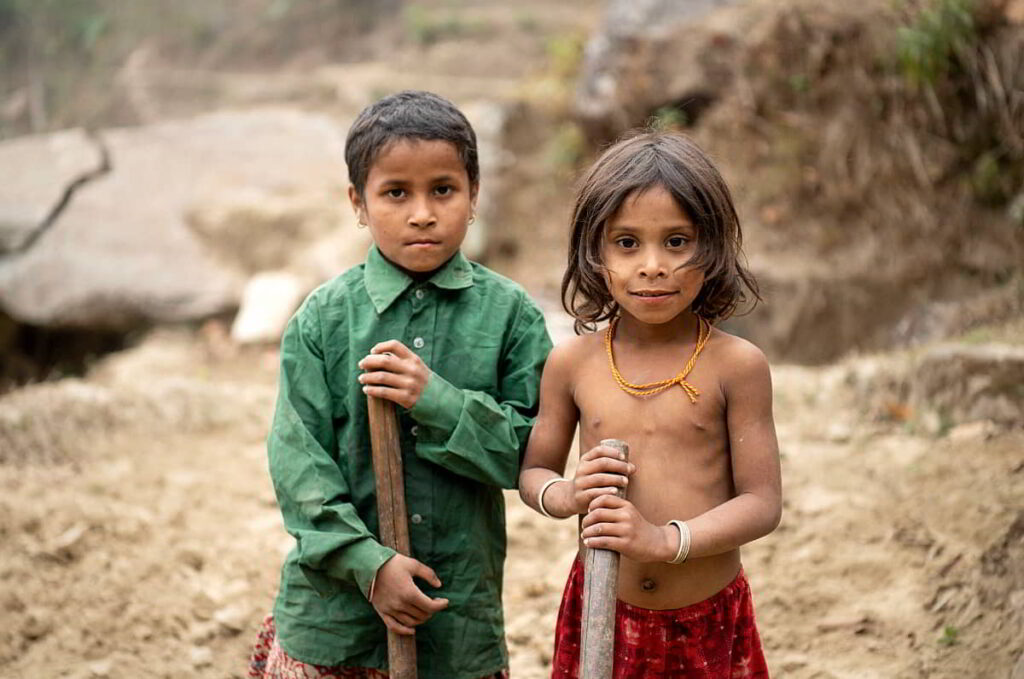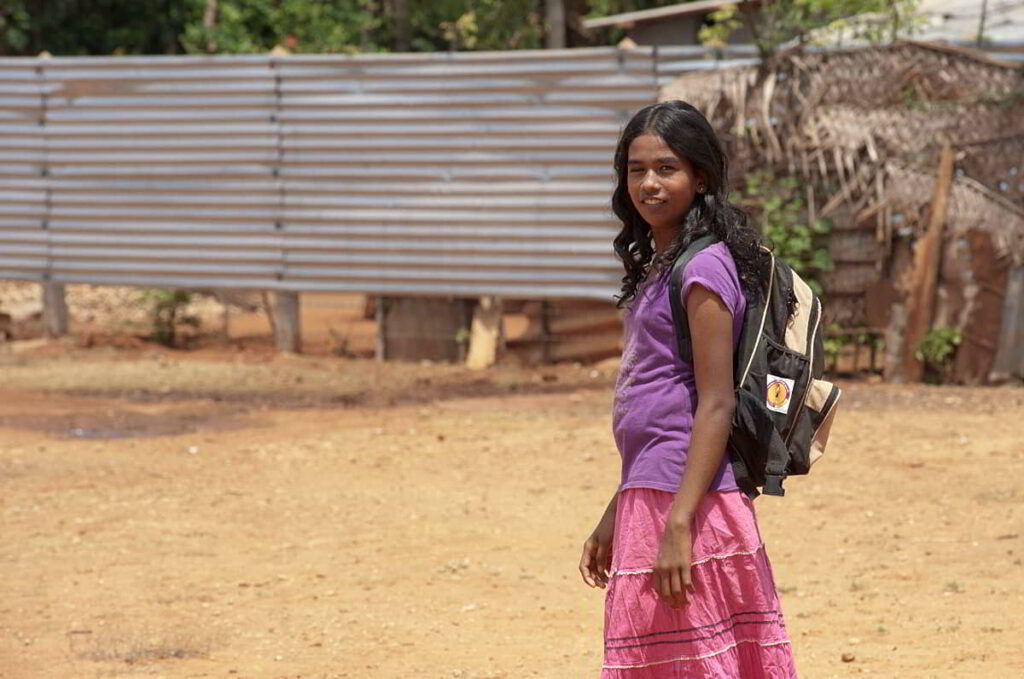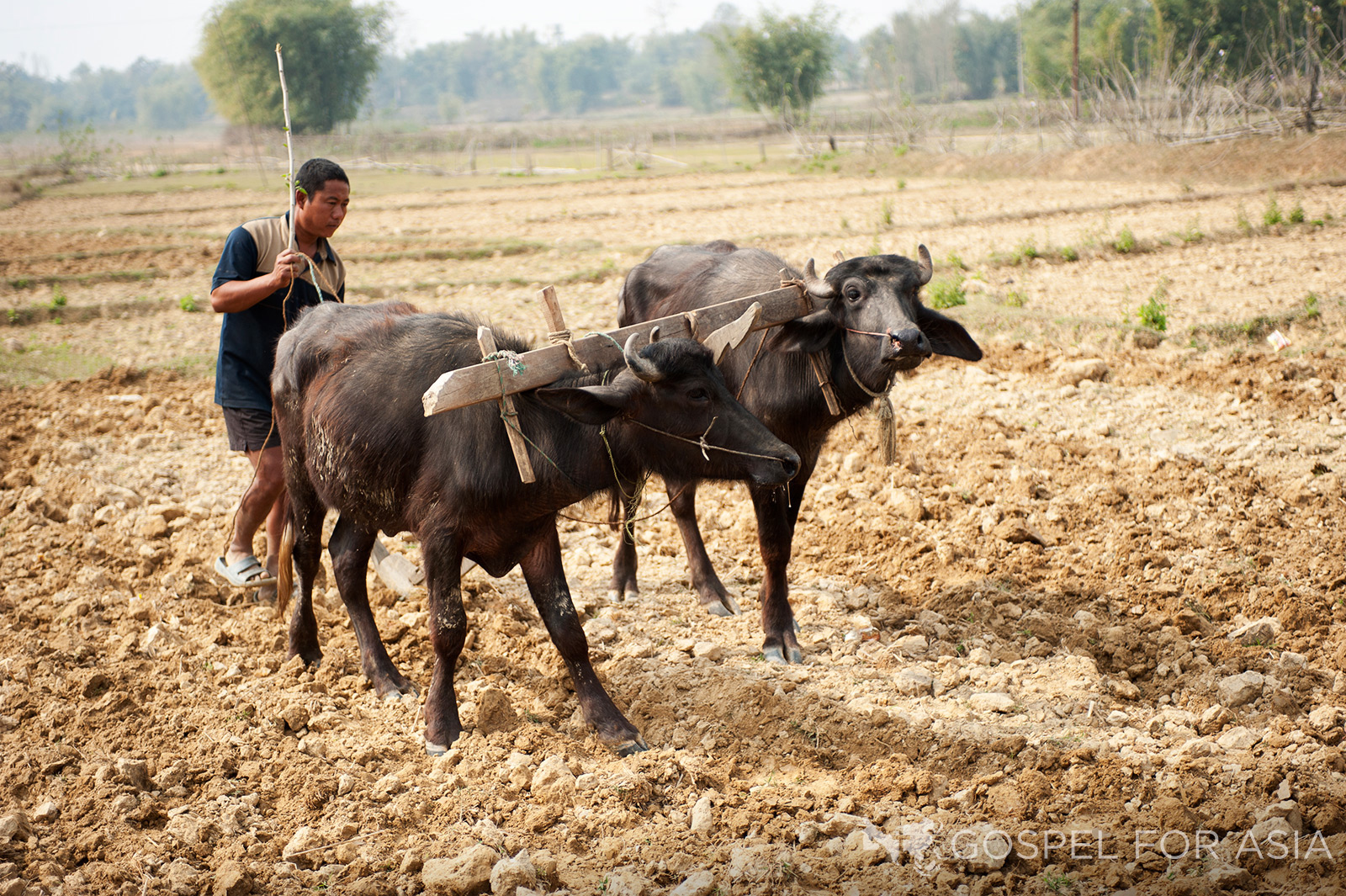In honor of the World Day of Social Justice, observed on February 20, Gospel for Asia released an in-depth special report about the social and economic injustices faced by so much of the world’s population. The stories and statistics it shares are heartbreaking: whole families being trapped in bonded labor, children forced to work in hazardous conditions and illiterate women vulnerable to exploitation in the workplace.
And it doesn’t end there. The report points out,
“Many more millions may not be so clearly enslaved, but they are also caught in poverty’s endless cycle, scrabbling to make a living as day laborers or scavengers.”

These children are two of 168 million child laborers; doing the backbreaking work of tilling a field to help their parents earn income for their family.
God forbid that we come to the place of sitting back and being comfortable and very careful about the way we approach these kinds of facts. There needs to be a pressing into the reality of what we are dealing with.
I remember hearing a story about a widow named Lalasa. She was only 35 years old, and when her husband died, she was left with four children to provide for. She sold wood to make a living, but it was barely enough for her family to survive.
Desperate to be able to meet the needs of her little ones, Lalasa borrowed money from others over and over again. But since she was never able to return the money, she only found herself in deeper trouble. Lalasa got so depressed that she eventually decided to commit suicide.
Before she could follow through on this decision, though, a GFA-supported worker named Jeevan found out about her situation and spent time encouraging her and praying for her—not just once, but many times. Gospel for Asia was also able to help provide her a cow through our Christmas Gift Catalog. Through selling milk, Lalasa’s economic situation began to improve, and now, instead of wanting to end her life, she has hope for the future.
I wonder when we hear stories like this if God is trying to help us understand more of His heart for the poor and downtrodden. When we run into someone like Lalasa, whether in person or through some sort of media, do we really care what becomes of them? Do we realize the value God places on them?
All throughout the Bible, you can see how God cares for the poor. He even made special provision for His people who somehow fell into poverty and had to sell their land or even sell themselves as slaves. Every fiftieth year was to be known as the Year of Jubilee, where all enslaved Israelites were set free and each one who had sold property could return to his own possessions (see Leviticus 25:8-17, 23-34, 39-55). The Lord didn’t allow them to stay in the situation they were in.
He even cared for the foreigners in Israel who were struggling. His people were commanded in the law: “When you reap the harvest of your land, you shall not wholly reap the corners of your field, nor shall you gather the gleanings of your harvest. And you shall not glean your vineyard, nor shall you gather every grape of your vineyard; you shall leave them for the poor and the stranger: I am the Lord your God” (Leviticus 19:9-10). You can see this being played out in the book of Ruth, where she was allowed to glean in Boaz’s field to provide for herself and her mother-in-law.
What about us? Do we have this kind of care in our hearts for those who have lost everything due to poverty or some social injustice? Are we willing to make our own abundance available to those who are poor and strangers? Or are we focused mainly on our own world and the things that affect us directly?
Each of us naturally cares for our children or others close to us. I have my children and my grandchildren. When I hear that one of them is not feeling well, my natural response is to be concerned about how they’re doing and pray for them.
But here is the question: is there room in our hearts, in our world, for someone like Lalasa? The difference between life and death for her was simply someone being there to encourage and pray for her and having the opportunity to receive the gift of a cow.
Can we see these struggling people as God sees them? Can we recognize they are people He made in His own image, just like He made us, our husbands, our wives, our children?
In Lamentations 1, the prophet Jeremiah looks at the calamity, tragedy, pain and suffering all around him and just weeps his eyes out. He’s basically asking, “Is this nothing to you, all you who pass by? Can’t you see what’s going on? Don’t you care?”
There’s a song by Phil Collins called “Another Day in Paradise” that pictures a similar situation, where a man passes a homeless woman on the street who needs help, but he ignores her, not wanting to stop or even look at her. The chorus goes on to make the listener think about the paradise we live in compared to those who have so much less. I’d encourage you to read the lyrics of the first verse and chorus and think about the challenge it presents.
I pray that we would not get so caught up in our own life and “paradise” that we miss the opportunities to be there for those the Lord loves. I pray that we would once again become those who will walk with Christ, the One who had nothing except the clothes on His back and was willing to sacrifice all for the sake of others.
There are millions more like Lalasa, desperately in need of help. We have a long way to go. As the GFA report on social justice says, “In the face of such enormous inequalities, it can be difficult to know how to respond and where to start. But just as the problem of social injustice is not really a single, abstract issue so much as the many individuals it affects, so ending inequality is about changing personal circumstances as well as addressing the structures that allow inequality to continue.”
It is possible to make a difference. Maybe it’s giving a cow or a rickshaw or a sewing machine. Maybe it’s sponsoring a child so they can receive an education and break the cycle of poverty holding their family down. Maybe it’s engaging in prayer and asking the Lord to give us His heart and help us to value people the way He does.
The important thing is to do something. And even if it seems like a small start, it may make all the difference in the world for that one person we open our heart to.
Read the full article Gospel for Asia released about social justice: “Seeking Justice and Defending Human Rights Wherever Poverty and Oppression Exist.”
Comment below how you are planning to make a difference for someone affected by social injustice!
=====
Click here, to read more articles by Dr. KP Yohannan Metropolitan, or visit Patheos.
Go here to know more about Dr. KP Yohannan: Facebook | Twitter | Book



Jesus said there will always be poor among you (John 12:8). Although this statement was on a different context but this is still a fact. So I believe wherever we go, we will always have an opportunity to help somebody who needs help. The challenge is whether we are sensitive enough to reach out to them to help or we just look away. A little help will always go a long way especially to those who are desperate.
Thank you GFA for being God’s arms and feet in this world where there will always be poor people. But even with the little help that you are able to help, it changes lives and gives hope to those who are in darkness. God bless you more GFA and the people behind your ministry.
Paul, you make a great point here. I think wherever we go, we can always find an opportunity to serve. It may not always present itself as commonly as it usually does, but it is always there. I think if we learn to think and operate in this way, we can be much more sensitive and helping to those in need. By doing this more often, we can actually have a chance to see how a little can go a long way,
Sad to say that my province is top 2 of the 10 poorest provinces in my country. In my own little way I have been involved in some humanitarian works- providing livelihood projects, building shelter, providing skills training, etc. in order to eradicate or even just to reduce poverty in our place. Being a part of the chosen few who are trying to make a difference in the lives of those who are suffering from social injustice is truly a very fulfilling endeavor.
I remember my case study during college, about a family having a 6 children, 3 of them are deaf. The family straggle financially and emotionally. But, when I ask them about how they overcome with their difficulties, they just answer, “I just pray”